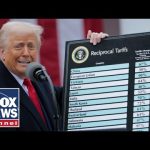President Donald Trump’s new tariffs on imported beef are getting strong support from American cattle ranchers who say the move will finally level the playing field. Fifth-generation rancher Steve Lucie from Illinois says the tariffs will cut back foreign competition and boost the value of U.S.-raised cattle. “We’ve been on the short end for too long,” Lucie explained. “Fair trade means people around the world get to taste the best beef in the world—ours.”
For years, countries like Australia have sold billions of dollars worth of beef to America while blocking U.S. products from their markets. Australia sold $29 billion in beef to the U.S. last year but didn’t allow a single American hamburger onto its shelves. Thailand and Vietnam slapped 30-50% tariffs on U.S. beef, making it nearly impossible for ranchers to compete. “Thank you, Mr. President,” said Wyoming ranchers in response to the new policy.
The National Cattlemen’s Beef Association praised the tariffs for tackling trade barriers that hurt U.S. exports. Ranchers like Alan Adams in Illinois say the changes will let them expand herds and create jobs. “Higher prices mean we can grow,” Adams said. “We just want the same chance to sell overseas that other countries get here.” The USDA reports the U.S. exported over $10 billion in beef last year, with top markets in Asia and North America.
Critics worry about rising grocery prices, but ranchers argue the long-term benefits outweigh short-term costs. “Markets always adjust,” Lucie said. “We feed 169 people per farmer. That won’t stop.” The Trump administration says cheap foreign beef undercuts U.S. ranchers and risks food security. “This is about sovereignty,” said Agriculture Secretary Brooke Rollins. “We’re taking back control.”
Some small farmers, like Jamie Ager in North Carolina, admit tariffs bring “good and bad” results. Higher cattle prices help, but expensive beef might turn shoppers to chicken or pork. Still, groups like R-CALF USA say tariffs will revive rural economies by keeping production local. “This is a win for Main Street, not Wall Street,” said CEO Bill Bullard.
The White House calls the tariffs a “declaration of economic independence” to reverse decades of trade deficits. President Trump vowed to protect industries critical to national security, saying, “Made in America isn’t just a tagline—it’s a survival strategy.” The 10% baseline tariff hit imports this week, with higher rates for top trade-deficit countries starting April 9.
Global markets reacted wildly to the news, with stocks swinging $2.4 trillion on false reports of a tariff “pause.” CNBC and Reuters issued corrections after the White House slammed the claims as “fake news.” Ranchers say the drama proves why America needs self-reliance. “We’ll keep doing our jobs,” Lucie said. “Let the talking heads panic.”
Conservatives hail the tariffs as a bold step to put America first. By prioritizing U.S. workers and businesses, the policy aims to rebuild manufacturing and secure the food supply. “Short-term pain for long-term gain,” Lucie concluded. “This is how we save our country.”




